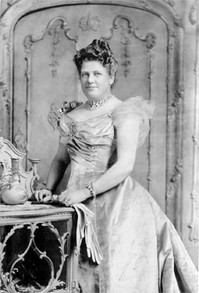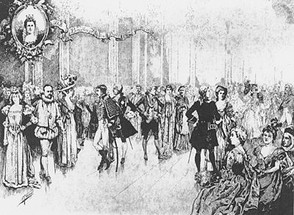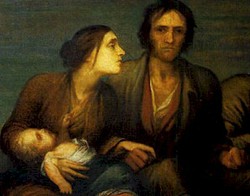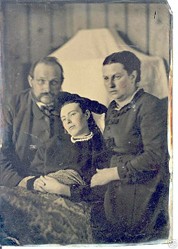
Scandal of the Bradley Martin Ball
by wcascade40
A costume ball in 1897 New York lead to controversy and scandal.
PARTY TO IMPROVE ECONOMY
The grand costume ball given in New York City in 1897 was supposed to be an elegant affair that would stimulate the local economy. Instead it caused a major scandal and lead to the family’s exile from the city.
The county had been in an economic slump off and on since 1873. The Bradley Martin family was not one of New York City’s first families. The family money was pretty new, however their daughter had recently married an English Earl and they were prominent in British society. But the family, especially Mrs. Bradley Martin, wanted to conquer New York.
Mrs. Bradley Martin planned a lavish costume ball. But she purposely did not give too much advance notice. Traditionally, whenever there was a ball or costume affair, the guests would order their costumes from Paris. New York did not have any famous designers, such as Worth. But the guests no choice, there was no time to get anything to wear from abroad. So the idea was that this would force the guest to patronize local dressmakers. This would stimulate the local economy.
STIMULATE EMPLOYMENT
Besides, the costumes, shops would be able to sell period jewelry and accessories. Local florists would supply the flowers. City stores would sell the wine and other items for the party. All of this would help the economy. The Bradley Martins said they would stimulate trade and give people honest work, rather than charitable hand outs. The ball used over 6,000 orchids and gave temporary employment to hundreds of people, including dressmakers, florists and coachmen.
So the family had a ball in the Waldorf Astoria and invited hundreds of prominent guests. So what was the problem? There were newspaper articles for weeks denouncing the ball. The newspapers had a lot of ammunition because the family issued regular press releases noting the guests, food and decorations.
It was considered scandalous that such an expensive party was happening in a time of economic adversity. It was considered insensitive and would anger the poor. Which it did, the ballroom windows had to be boarded up to prevent a bomb from being thrown into the party, as had been threatened by anarchists. Many people felt the family was flaunting their wealth in a vulgar fashion.
typical costume worn to the ball
The party itself was actually considered a success. Mrs. Bradley Martin went as Mary, Queen of Scots, wearing jewels formerly belonging to Louis XIV. Her elaborate costume had a 20 foot train. Mrs. Astor decorated her costume with $200,000 in jewels. Oliver Belmont wore a suit of armor inlaid with gold. Most of the guests wore expensive costumes accompanied by expensive jewelry. The party cost about $370,000 dollars, which is about 10 million dollars in today’s money
There was extensive fall out from the party. The party continued to be condemned in the press and the Bradley Martins were vilified. The family did bring some of the wrath on themselves, the regular press releases about the party stoked the flames. A few people spoke up for them, saying they should be able to spend their money however they want, but they were in the minority.
The final blow was that the New York City tax assessors doubled the family’s tax bill. The Bradley Martins gave up and moved permanently to London, where their party would have not been at all controversial.
 |  |
| America in the Gilded Age: Third Edition NYU Press Only $23.95 | New Spirits: Americans in the Gilded ... Oxford University Press, USA |
You might also like
Was the Irish Potato Famine a Genocide?Between 1845-1851, nine million Irish people starved. At the same time, food ...
Sleeping Beauties: The Victorians and Post-Mortem PhotographyLess divorced from death than we are today, the Victorians took keepsakes tha...






 Invention of Breakfast Cerealon 08/24/2011
Invention of Breakfast Cerealon 08/24/2011
 Sniglets Words that don't appear in a Dictionary but should.on 08/24/2011
Sniglets Words that don't appear in a Dictionary but should.on 08/24/2011
 Halloween romantic superstitionon 08/23/2011
Halloween romantic superstitionon 08/23/2011
 Safety Bicycle sparks cycling craze in USon 08/23/2011
Safety Bicycle sparks cycling craze in USon 08/23/2011


Comments
Enjoyed this insight into 1890s New York City. It sounds like the Bradley Martins meant well, it just didn't go down quite as they intended.